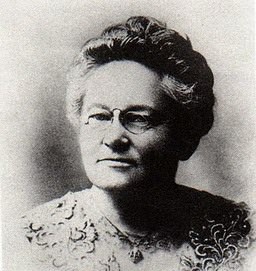Fannie Farmer: The Woman Behind the Measure

Fannie Merritt Farmer wasn’t just a cook—she was a force of nature in the kitchen. Born in Boston in 1857, Fannie’s early life was shaped by a strong sense of discipline and a relentless pursuit of knowledge.

Even as a young girl, she was known for her inquisitive mind and meticulous nature, traits that would later define her approach to cooking.

When illness struck at 16, leaving her partially paralyzed, Fannie found herself spending more and more time in the kitchen—a space that became both her refuge and her laboratory. What might have been a tragic setback for someone else became a catalyst for Fannie’s burgeoning passion for cooking.

But she didn’t just cook; she experimented, questioned, and pushed boundaries.

Precision as Passion: The Birth of Exact Measurements
In Fannie’s time, cooking was often a haphazard affair. Recipes passed down through generations were vague at best—“a handful of flour,” “a pinch of salt,” “bake until done.” This kind of imprecision drove Fannie crazy. How could anyone expect consistent results with such ambiguous instructions? This frustration sparked her obsession with precision.

Fannie was particularly known for her love of exact measurements, a passion that would revolutionize American cooking.
But where did this obsession come from? It started with her relentless quest for consistency. In her own kitchen, she used whatever tools were available—simple cups, spoons, and scoops—to measure ingredients. But she wasn’t satisfied with approximations.

She often used an old tin cup, a family heirloom, as her standard measuring tool. When she realized that even slight variations in how ingredients were measured could drastically alter a recipe’s outcome, she began to refine her methods. This led to the development of the standardized measuring cups and spoons we take for granted today.
Imagine Fannie in her kitchen, carefully spooning flour into that tin cup, leveling it off with the back of a knife, and recording the results in her notebook. Every success and failure was meticulously documented.

But Fannie didn’t stop there.
She was also keen on improving the tools of her time. She was an advocate for the use of accurate scales in the kitchen, something that was almost unheard of for home cooks in the 19th century.
Her insistence on using scales for ingredients like butter or sugar showed her deep commitment to precision. She believed that cooking could be as exact a science as chemistry—where a miscalculation could lead to disastrous results.

Tools of the Trade: Fannie’s Kitchen Arsenal
Fannie’s kitchen was a place where practicality met innovation. She was known for her collection of gadgets and tools, many of which she modified to suit her needs.
One of her favorite tools was a simple wooden spoon—nothing fancy, but in her hands, it was a precision instrument. She would often use it to carefully mix batter, making sure every stroke was even, every fold precise. To Fannie, even something as mundane as stirring had a right and wrong way to be done.

She was also known for her love of cast iron pans. Unlike the lightweight, flimsy cookware of the time, Fannie preferred the durability and even heat distribution that cast iron provided. She often said that a good pan was an investment in future meals—a philosophy that many home cooks still swear by today.

Fannie was an early adopter of the double boiler, a tool that allowed for gentle heating, essential for delicate sauces and custards.
She was a firm believer in cooking slowly and carefully, coaxing out flavors without burning or curdling. This methodical approach was another way she ensured consistency, no matter what dish she was preparing.

A Teacher at Heart: Sharing Knowledge with the World
Fannie’s love for cooking wasn’t just about the food; it was about sharing knowledge. When she joined the Boston Cooking School, she found her true calling—not just as a cook, but as an educator. She had a way of demystifying complex techniques, breaking them down into simple, manageable steps. Her students adored her for her patience and her ability to make even the most intimidating recipes feel accessible.

One of her favorite teaching moments involved something as simple as boiling water. Fannie would gather her students around and demonstrate the exact moment when water reaches a rolling boil, explaining how even a few degrees could make the difference between a perfect poached egg and a rubbery mess. She was passionate about the science behind cooking, and she made sure her students understood the why behind every step.

Fannie’s book, "The Boston Cooking-School Cook Book," was an extension of this teaching philosophy. She wanted every home cook to feel like they had a trusted guide by their side, leading them through the process with clear, precise instructions. The book was full of Fannie’s personality—practical, no-nonsense, but always encouraging.
It was the first cookbook to really speak to the average American home cook, offering them the tools to succeed in the kitchen.

Fannie’s Legacy: More Than Just a Cookbook
Fannie Farmer wasn’t just a cook—she was a pioneer who believed that cooking could be both an art and a science. Her insistence on precision didn’t come from a desire to control but from a deep understanding that anyone, with the right tools and knowledge, could create something wonderful.
She was a woman who turned her kitchen into a classroom, her recipes into lessons, and her passion into a legacy that has endured for over a century.
So next time you reach for a measuring cup or level off a spoonful of flour, remember Fannie.
✦ She’s the reason you know exactly how much you need.
✦ She’s the one who believed that with a little care and a lot of love, anyone could cook a perfect meal. And in doing so, she changed the way we cook forever.
Fannie Farmer didn’t just change the way people cooked—she showed us that every detail matters, and that the care we put into our cooking is a reflection of the love we share.
✨ Next time you’re in the kitchen, remember that you’re not just following a recipe—you’re continuing a tradition. Whether it’s a simple family dinner or a special treat, what you create in your kitchen today becomes a part of your own story, just like Fannie’s.
So measure, stir, and cook with intention, knowing that you’re leaving a little bit of yourself in every dish. That’s the real legacy—one that nourishes not just the body, but the heart.

Fannie Merritt Farmer (23 March 1857 – 16 January 1915)
